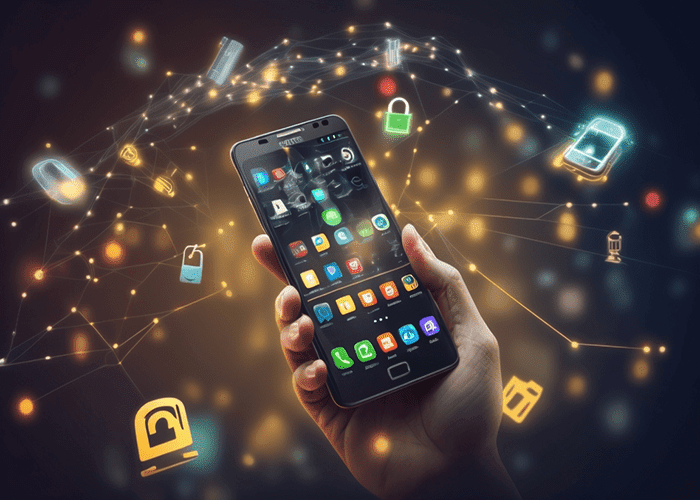8 Security Tips to Protect Your Smartphone and Your Personal Data
It's essential to recognize in the field of mobile security that our smartphones are no longer just communication tools; they are now storage devices, audio, and video recording devices, as well as portals to our bank accounts.
Unfortunately, many users frequently neglect mobile security, often due to a poor understanding of the risks associated with carefree behavior in the digital world.
Mobile devices are particularly vulnerable to cyber-attacks, such as malware, spyware, and phishing attempts, which can compromise the sensitive data we carry in our pockets due to their portability and many features.
Cybercriminals are taking advantage of users' tendency to behave carelessly with their connected devices, knowing that compromising smartphones can be lucrative by providing access to private information.
To protect your smartphone and your data from the most common mobile security threats, here are some essential preventive measures:
1. Make sure your devices and applications are up to date:
- Update your applications and
operating system regularly.
An up-to-date system can protect your smartphone or tablet from
potential flaws or vulnerabilities. Keep an eye out for software update
notifications and reminders that may appear on your screen, and install patches
manually as soon as you have the time if you don't like automatic updates.
2. Remove unused applications:
Obsolete applications can contain security holes. Regular cleanup
strengthens your device's security.
Obsolete and unused applications can conceal serious security flaws that
jeopardize the security of your device.
Remember to search the application library for any applications you no longer need. A clean-up will make your device more secure and your favorite applications easier to find.
3. Back up your data:
Regular backups are crucial to prevent data loss in the event of theft
or malicious attack.
Memory cards on Android mobile devices currently offer a large storage
capacity for contacts, messages, files, videos, and photos. However, in the
event of theft or malicious compromise such as a ransomware attack, making
regular backups of your data is essential.
4. Protect against phishing and smishing attacks:
- Be careful when receiving unsolicited SMS messages and e-mails, and avoid clicking on suspicious links. Never share personal data in response to unsolicited requests.
SMS attacks, also known as smishing, seek to entice recipients to access a malicious link via SMS, just like phishing. Smishing attacks use social engineering techniques to convince recipients to transmit personal information or download malware onto the device.
Avoid unsolicited SMS messages, especially those claiming to be from your bank and asking for financial or personal information.
When checking your e-mail, beware of unsolicited messages that seek to create a sense of urgency or panic fear. Keep in mind that chances are, something sounds too wonderful to be true.
All unexpected messages received by SMS or e-mail should be deleted and not replied to.
5. Avoid answering suspicious calls:
When making unsolicited phone calls, avoid sharing sensitive information. If something sounds suspicious, hang up immediately.
What's more, scammers and fraudsters can call you on the phone. The scammer, like any good cybercriminal, will try to convince you that their offer is real or that their call is justified. Hang up immediately if you are asked for personally identifiable information, such as bank account numbers, PIN codes, or credit card numbers. Another important warning sign is intimidation or threats.
6. Don't participate in unsecured public Wi-Fi networks:
Public networks are vulnerable to security. When using these networks, avoid sharing personal information.
Public Wi-Fi networks are rarely secure, offering more ways to compromise your device. As a result, even though travel and vacations have been curtailed due to the health crisis, the risks of malicious interference have not disappeared.
Les utilisateurs envoyant des informations personnelles telles que les données de connexion et les coordonnées financières sur un réseau Wi-Fi public peuvent faire face à de nombreuses menaces, notamment le vol d'informations personnelles. De plus, les cybercriminels peuvent utiliser un stratagème appelé attaque de l'homme du milieu pour imiter un réseau Wi-Fi public légitime. Les utilisateurs de ces réseaux malveillants sont susceptibles de voler des données, d'être infectés par des logiciels malveillants et de détourner des fonds.
7. Use biometrics and strong passcodes:
By using strong passcodes and enabling biometric features such as facial or fingerprint recognition, strengthen the security of your smartphone.
8. Security at home or on the move:
Use a cybersecurity solution tailored to your smartphone for comprehensive protection against online threats, including an integrated VPN, to secure your online activity, whether you're at home or on the move.
Protecting against mobile threats doesn't have to be a laborious process that requires comprehensive security knowledge.
A cybersecurity solution installed on your smartphone or tablet protects both your device from cyberattacks and your personal data from cyberattacks.
When you surf the Internet, Bitdefender uses Web filtering technology to prevent you from accessing malicious websites. With anti-phishing protection and anti-fraud filtering systems built into our security solution, you won't have to worry about suspicious websites or scams.
Bitdefender Mobile Security, compatible with iOS (iPhone and iPad) and Android devices, protect your data at all times, whether you're at home, in your favorite café or on vacation.
You can strengthen your smartphone's security and protect your personal information from potential threats by following these tips.
Conclusion:
mobile device security is an essential part of contemporary digital life. We can maximize the protection of our smartphones and personal data by adopting proactive security practices and remaining vigilant to potential threats. To ensure a robust defense against cyber threats, whether you're at home or on the move, opt for reliable, integrated cybersecurity solutions. Take action now to protect your digital life, because you are responsible for the security of your information.




No comments:
Post a Comment